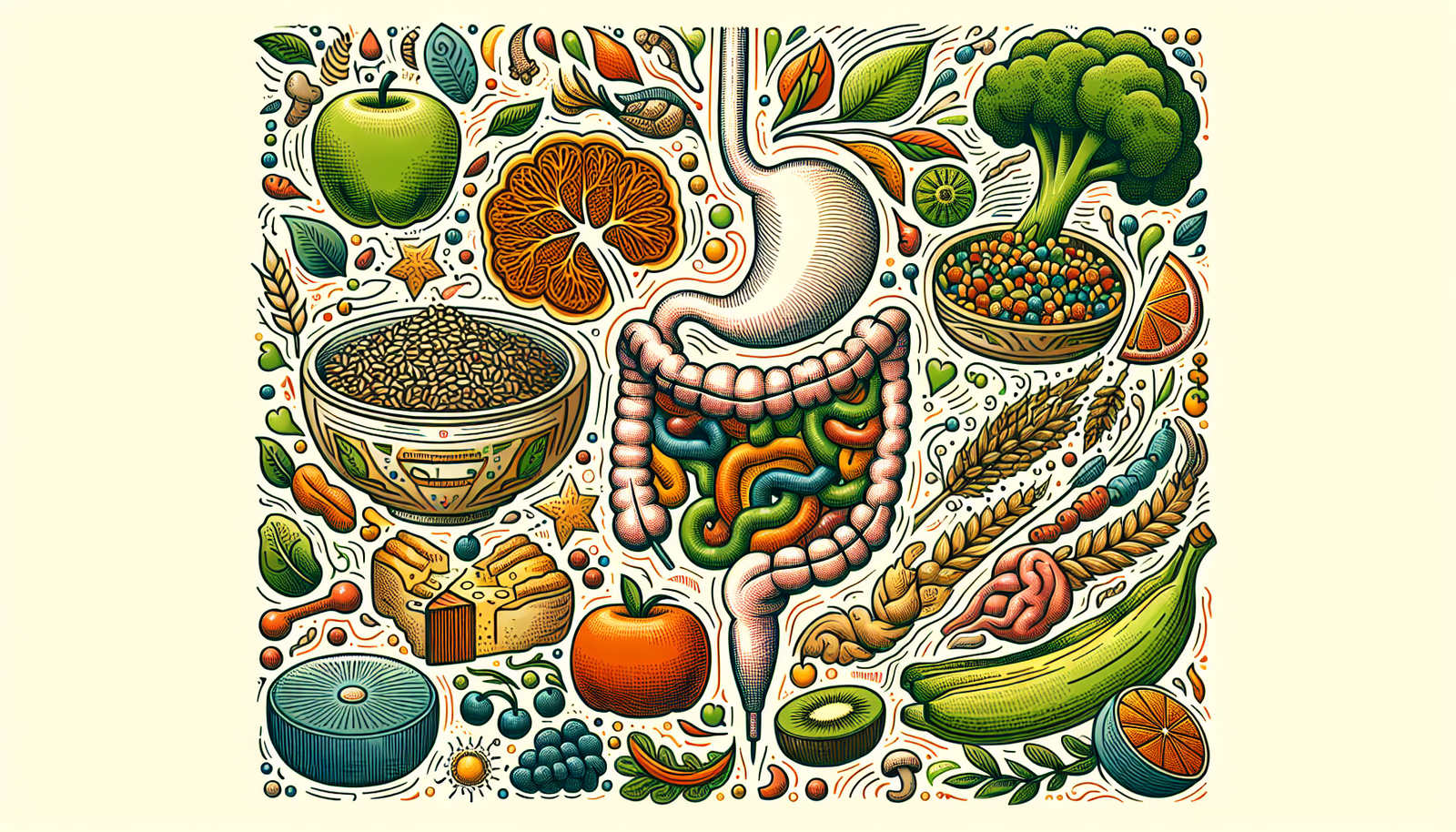Tips for Maintaining a Healthy Gut
Tips for Maintaining a Healthy Gut
Understanding Gut Health
Maintaining a healthy gut is essential for optimal overall health. The gut is home to trillions of microorganisms, known as the gut microbiota, which play a crucial role in digestion, immune function, and even mental health. Research has shown links between gut health and various conditions, including obesity, diabetes, and inflammatory bowel diseases. A thriving gut microbiome supports the body’s ability to absorb nutrients effectively and fend off diseases.
1. Incorporate a Diverse Range of Foods
Variety is Key
Eating a wide variety of foods can promote a diverse gut microbiome. Different types of bacteria thrive on different types of nutrients. Aim to include a mix of different fruits, vegetables, whole grains, legumes, and lean proteins in your diet.
Foods to Include:
- Fruits: Apples, bananas, berries, and citrus fruits.
- Vegetables: Leafy greens, carrots, beets, and broccoli.
- Whole Grains: Quinoa, barley, oats, and brown rice.
- Legumes: Lentils, chickpeas, and black beans.
Fiber-Rich Foods
High-fiber foods are particularly beneficial because they serve as fuel for good bacteria. Soluble fiber, found in oats, beans, and fruit, helps to support digestive health.
2. Focus on Fermented Foods
Boost Your Probiotics
Fermented foods are rich in probiotics, which are beneficial bacteria that can improve gut health. Consuming these foods can help balance the gut microbiome and enhance digestion.
Top Fermented Foods to Include:
- Yogurt: Choose yogurt that contains live and active cultures.
- Kefir: A fermented dairy drink packed with probiotics.
- Sauerkraut: Fermented cabbage that is rich in fibers and vitamins.
- Kimchi: A spicy Korean dish made from fermented vegetables.
- Kombucha: A fermented tea beverage that also provides probiotics.
3. Stay Hydrated
Drink Plenty of Water
Staying hydrated is crucial for maintaining a healthy gut. Water helps to dissolve nutrients and soluble fiber, allowing for effective absorption. Proper hydration also promotes the movement of food through the digestive tract.
Hydration Tips:
- Aim for at least 8-10 cups of water per day; more if you are active.
- Consider drinking herbal teas, which can also aid digestion.
4. Limit High-Sugar and Processed Foods
Reduce Sugar Intake
A diet high in sugar and processed foods can disrupt the balance of gut bacteria. These foods promote the growth of harmful bacteria and can lead to gut inflammation.
Foods to Avoid:
- Sugary snacks and desserts
- Processed meats
- Refined carbohydrates (white bread, pastries)
Opt for whole, unprocessed foods whenever possible.
5. Manage Stress Levels
Mind Your Mind
Chronic stress can negatively impact gut health. Stress can alter gut microbiota composition and lead to digestive issues. Incorporating stress-reducing practices can benefit both your mental and digestive health.
Stress Management Techniques:
- Meditation: Mindfulness practices can help reduce stress and improve gut health.
- Yoga: Gentle yoga stretches not only relieve tension but also stimulate digestion.
- Deep Breathing Exercises: Simple breathing techniques can promote relaxation.
6. Get Regular Exercise
Move Your Body
Regular physical activity is not only good for the heart and mind; it also promotes a healthy gut. Exercise can increase the diversity of gut microbiota and enhance digestive function.
Exercise Recommendations:
- Aim for at least 150 minutes of moderate aerobic activity or 75 minutes of vigorous activity each week.
- Incorporate strength training exercises at least two days a week.
7. Incorporate Prebiotic Foods
Feed Your Good Bacteria
Prebiotics are non-digestible food ingredients that promote the growth of beneficial bacteria in the gut. They are found in many fiber-rich foods.
Top Prebiotic Foods:
- Garlic: Contains compounds that stimulate the growth of healthy gut bacteria.
- Onions: Another great source of prebiotics, beneficial for gut health.
- Leeks, Asparagus, and Bananas: These foods promote the growth of probiotics.
8. Get Enough Sleep
Prioritize Rest
Quality sleep is vital for overall health, including gut health. Poor sleep patterns can lead to imbalances in gut bacteria and exacerbate digestive issues.
Sleep Tips:
- Aim for 7-9 hours of quality sleep each night.
- Establish a regular sleep schedule by going to bed and waking up at the same time each day.
- Create a calming bedtime routine to promote relaxation.
9. Pay Attention to Food Intolerances
Identify and Avoid Trigger Foods
Food intolerances can lead to inflammation and gut issues. Common triggers include gluten, lactose, and artificial additives. Keeping a food diary can help you identify foods that contribute to digestive discomfort.
Food Intolerance Management:
- Eliminate suspected trigger foods from your diet for a period of time to assess changes in gut health.
- Gradually reintroduce foods to identify specific intolerances.
10. Consider Probiotic Supplements
Consult a Healthcare Provider
In some cases, probiotic supplements can be beneficial for maintaining gut health, particularly after antibiotic treatment that disrupts the gut microbiome. Always consult with a healthcare professional before starting any new supplement.
Choosing Probiotics:
- Look for reputable brands that specify the strains of probiotics used.
- Checkout CFU (colony-forming units) to ensure you’re getting a potent dose.
11. Limit Alcohol Consumption
Moderation is Key
Excessive alcohol consumption can negatively affect the gut microbiome and lead to digestive issues. Moderation can help maintain gut health.
Alcohol Guidelines:
- If you choose to drink, limit consumption to one drink per day for women and two for men.
- Consider non-alcoholic alternatives, such as flavored sparkling water or herbal teas.
12. Emphasize Gut-Friendly Nutrients
Nutrient-Dense Choices
Focus on incorporating gut-friendly nutrients into your diet, such as omega-3 fatty acids, polyphenols, and antioxidants. These compounds can help reduce inflammation and promote a healthy microbiome.
Nutrient Sources:
- Omega-3 Fatty Acids: Found in fatty fish, flaxseeds, and walnuts.
- Polyphenols: Present in berries, dark chocolate, and green tea.
- Antioxidants: Abundant in colorful fruits and vegetables.
13. Regular Health Check-Ups
Stay Proactive
Regular check-ups with healthcare professionals can help monitor and maintain gut health. Discuss any persistent digestive issues to ensure proper management.
What to Discuss:
- Symptoms of bloating, gas, diarrhea, or constipation.
- Concerns about food intolerances or sensitivities.
14. Embrace a Mindful Eating Practice
Listen to Your Body
Mindful eating involves paying full attention to the experience of eating and drinking, both inside and outside the body. This practice can lead to a better relationship with food and promote digestive health.
Tips for Mindful Eating:
- Eat slowly and without distractions, such as television or mobile devices.
- Pay attention to hunger cues and fullness signals.
- Savor each bite and appreciate the flavors and textures of your food.
15. Stay Informed and Flexible
Adapt as Necessary
Gut health is individual, and what works for one person may not work for another. Continue to educate yourself on gut health and be open to making changes based on your body’s responses.
Resources for Ongoing Learning:
- Books on nutrition and gut health.
- Online courses and webinars.
- Support groups or forums focused on health and wellness.
By implementing these tips, you can nourish your gut and enhance your overall health. A well-balanced diet, healthy lifestyle choices, and mindful practices will foster a thriving intestinal environment, supporting your well-being for years to come.








